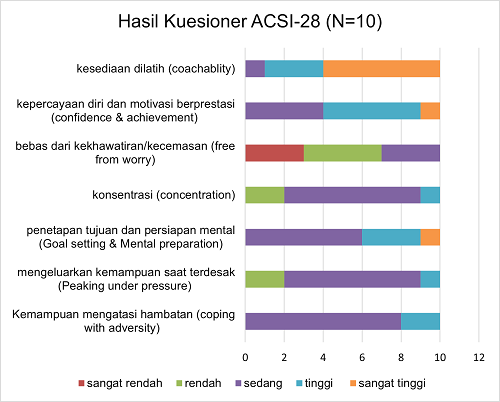
Mendesain pelatihan mental skills untuk atlet pencak silat pelajar di wilayah Kabupaten Malang
Abstract
Keywords
Full Text:
PDFReferences
Alfermann, D., Stambulova, N., & Zemaityte, A. (2004). Reactions to sport career termination: A cross-national comparison of German, Lithuanian, and Russian athletes. Career Transitions in Sport, 5(1), 61–75. https://doi.org/10.1016/S1469-0292(02)00050-X
Aliyyah, A., Wicaksono, B., Saniatuzzulfa, R., & Mukholid, A. (2020). Relevance of self efficacy and female futsal athletes’ anxiety before the match. Jurnal SPORTIF : Jurnal Penelitian Pembelajaran, 6(1), 105–117. https://doi.org/10.29407/js_unpgri.v6i1.14080
Balyi, I., Richard, W., Higgs, C., Norris, S., & Cardinal, C. (2016). Sport for Life – Long-Term Athlete Development Resource Paper 2.1. Sport for Life Society.
Burton, D., & Raedeke, T. (2008). Sport Psychology for Coaches. Human Kinetics.
Einarsson, E. I., KristjánsdÓttir, H., & Saavedra, J. M. (2020). Relationship between elite athletes’ psychological skills and their training in those skills. Nordic Psychology, 72(1), 23–32. https://doi.org/10.1080/19012276.2019.1629992
Fletcher, D., & Sarkar, M. (2012). A grounded theory of psychological resilience in Olympic champions. A Sport Psychology Perspective on Olympians and the Olympic Games, 13(5), 669–678. https://doi.org/10.1016/j.psychsport.2012.04.007
Gould, D., Dieffenbach, K., & Moffett, A. (2002). Psychological Characteristics and Their Development in Olympic Champions. Journal of Applied Sport Psychology, 14(3), 172–204. https://doi.org/10.1080/10413200290103482
Holt, N. L., Neely, K. C., Slater, L. G., Camiré, M., Côté, J., Fraser-Thomas, J., MacDonald, D., Strachan, L., & Tamminen, K. A. (2017). A grounded theory of positive youth development through sport based on results from a qualitative meta-study. International Review of Sport and Exercise Psychology, 10(1), 1–49. https://doi.org/10.1080/1750984X.2016.1180704
Nicholls, A. R., & Polman, R. C. J. (2007). Coping in sport: A systematic review. Journal of Sports Sciences, 25(1), 11–31. https://doi.org/10.1080/02640410600630654
Nisa, K., & Jannah, M. (2021). Pengaruh kepercayaan diri terhadap ketangguhan mental atlet bela diri. Character: Jurnal Penelitian Psikologi, 8(3), 36-45. https://ejournal.unesa.ac.id/index.php/character/article/view/41165
Rahayuni, K. (in press). Pemanfaatan ACSI-28 (Athletic Coping Skills Inventory-28) Versi Bahasa Indonesia Sebagai Alat Ukur Psikologis Atlet. Prosiding Temu Ilmiah Nasional Ikatan Psikologi Olahraga (IPO), 1.
Rahayuni, K., Yunus, M., & Fadil, R. (2015). Analisis Psikometri Validitas Dan Reliabilitas Kuesioner Athletic Coping Stress Inventory-28 (Csai-28) Dalam Bahasa Indonesia. Motion: Jurnal Riset Physical Education, 6(1), 17-31. https://jurnal.unismabekasi.ac.id/index.php/motion/article/view/522
Ryba, T. V., Stambulova, N. B., Si, G., & Schinke, R. J. (2013). ISSP Position Stand: Culturally competent research and practice in sport and exercise psychology. International Journal of Sport and Exercise Psychology, 11(2), 123–142. https://doi.org/10.1080/1612197X.2013.779812
Ryba, T. V., & Wright, H. K. (2005). From Mental Game to Cultural Praxis: A Cultural Studies Model’s Implications for the Future of Sport Psychology. Quest, 57(2), 192–212. https://doi.org/10.1080/00336297.2005.10491853
Sartono, S., Suryaman, O., Hadiana, O., & Ramadan, G. (2020). Hipnoterapi untuk kecemasan: Sebuah uji coba pada pemain sepakbola. Jurnal SPORTIF : Jurnal Penelitian Pembelajaran, 6(1), 216–225. https://doi.org/10.29407/js_unpgri.v6i1.13832
Schinke, R. J., Fisher, L. A., Kamphoff, C., Gould, D. R., & Oglesby, C. (2016). Certified consultants’ attempts at cultural inclusiveness: An examination of four tales through the lens of the International Society of Sport Psychology Position Stand on Cultural Competence. International Journal of Sport and Exercise Psychology, 14(4), 353–368. https://doi.org/10.1080/1612197X.2015.1041544
Smith, R. E., Schutz, R. W., Smoll, F. L., & Ptacek, J. T. (1995). Development and Validation of a Multidimensional Measure of Sport-Specific Psychological Skills: The Athletic Coping Skills Inventory-28. Journal of Sport and Exercise Psychology, 17(4), 379–398. https://doi.org/10.1123/jsep.17.4.379
Torregrosa, M., Boixadós, M., Valiente, L., & Cruz, J. (2004). Elite athletes’ image of retirement: The way to relocation in sport. Career Transitions in Sport, 5(1), 35–43. https://doi.org/10.1016/S1469-0292(02)00052-3
Vealey, R. (2007). Mental skills training in sport. In G. Tenenbaum & R. C. Ecklund (Eds.), Handbook of Sport Psychology (3rd ed., pp. 287–309). Wiley.
Wylleman, P., & Rosier, N. (2016). Chapter 13—Holistic Perspective on the Development of Elite Athletes. In M. Raab, P. Wylleman, R. Seiler, A.-M. Elbe, & A. Hatzigeorgiadis (Eds.), Sport and Exercise Psychology Research (pp. 269–288). Academic Press. https://doi.org/10.1016/B978-0-12-803634-1.00013-3
DOI: http://dx.doi.org/10.17977/um075v2i12022p36-47
Refbacks
- There are currently no refbacks.
Copyright (c) 2022 Kurniati Rahayuni, Nurrul Riyadh Fadhli, Suhud Indratno

This work is licensed under a Creative Commons Attribution-ShareAlike 4.0 International License.


_-_Copy1.jpg)


_-_Copy.jpg)
.jpg)




